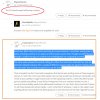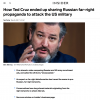hanimmal
Well-Known Member
https://www.washingtonpost.com/opinions/russia-hasnt-just-hacked-our-computer-systems-its-hacked-our-minds/2020/12/17/7ddd72a8-40a7-11eb-8bc0-ae155bee4aff_story.html

The more we learn about the recent hack into dozens of America’s most critical computer networks — widely attributed to Russia — the more it becomes clear that it is massive, unprecedented and crippling. Tom Bossert, who served as homeland security adviser to President Trump, writes, “It will take years to know for certain which networks the Russians control and which ones they just occupy.” (We do know they successfully penetrated the Department of Homeland Security’s systems as well as those of Treasury, Commerce and others.) Stanford’s Alex Stamos describes it as “one of the most important hacking campaigns in history.” The New York Times’ David E. Sanger, who has written several books on cyberweapons, co-wrote an article calling the breach “among the greatest intelligence failures of modern times.”
Vladimir Putin’s Russia has significantly expanded its hybrid warfare, using new methods to spread chaos among its adversaries. The United States will have to fortify its digital infrastructure and respond more robustly to the Kremlin’s mounting cyberattacks. But what about the perhaps more insidious Russian efforts at disinformation, which have helped to reshape the information environment worldwide?
In 2016, two scholars at Rand Corp. wrote a paper describing Russia’s “firehose of falsehood” propaganda model. Very different from Cold War-era propaganda, current Russian approaches work with prevailing technologies and social media platforms. There are two key features — “high numbers of channels and messages and a shameless willingness to disseminate partial truths or outright fictions.” There is no effort at consistency or credibility. The report quotes one analyst: “New Russian propaganda entertains, confuses and overwhelms the audience.”
Russia’s method closely resembles Trump’s own propaganda strategy. Trump issues a blizzard of messages, using every medium he can find. He is usually untruthful but always entertaining. He never worries about consistency, asking only that you remember his most recent claims. When campaigning in 2016 he argued that the unemployment rate was a hoax, that the Federal Reserve was keeping interest rates dangerously low and that the stock market was a bubble about to burst. Once he entered the White House, he soon said the opposite about all three. If you bombard people in the present, few have time to dwell on the past.
Wittingly or unwittingly, Trump uses the Russian model, which rests on the principle that people get convinced when they hear the same message many times from a variety of sources, no matter how biased. He adds to this an intuitive understanding of how social media works. If you make a claim that is truly outrageous, it will attract attention and eyeballs, spread far and wide, and ensure that people hear it repeatedly — and over time begin to believe it. A boring truth dies on Twitter, while a sensational lie goes viral and (most disturbingly) over time become a half-truth. (I recently experienced this myself. A commentary of mine was edited so that I seemed to be saying close to the opposite of what I actually was, which then ensured that it was widely disseminated.)
Trump has set a new standard because he simply does not view the truth as a constraint. A principled conservative would explain that Republicans do not have a replacement for Obamacare because they don’t believe the federal government should be required to guarantee health care as a right. Trump’s method is easier — he simply asserts that he has a plan, even better than Obamacare. Trump has announced he will veto the defense appropriations bill, apparently because it removes Confederate names from bases and does not repeal Section 230, a rule about social media companies. But he decided it would be simpler to claim that “THE BIGGEST WINNER OF OUR NEW DEFENSE BILL IS CHINA.” There is no conceivable sense in which this is factual — the bill actually would create a formal deterrence initiative against Chinese expansionism. But Trump understands that a sensational lie is far more effective than a complicated truth.
The pandemic might have accelerated these trends toward disinformation. Socially isolated, cut off from most communities, Americans seem even more susceptible to theories that confirm their partisan beliefs. The most startling fact about 2020 is not that Trump tried to overturn the results of the election. Many of us predicted he would try. What is stunning is that, according to the polls, 60 million Americans believe his assertions and the series of lies that sustain them. The problem is not just that Russia has hacked America’s computer systems. It seems to have hacked our minds.










